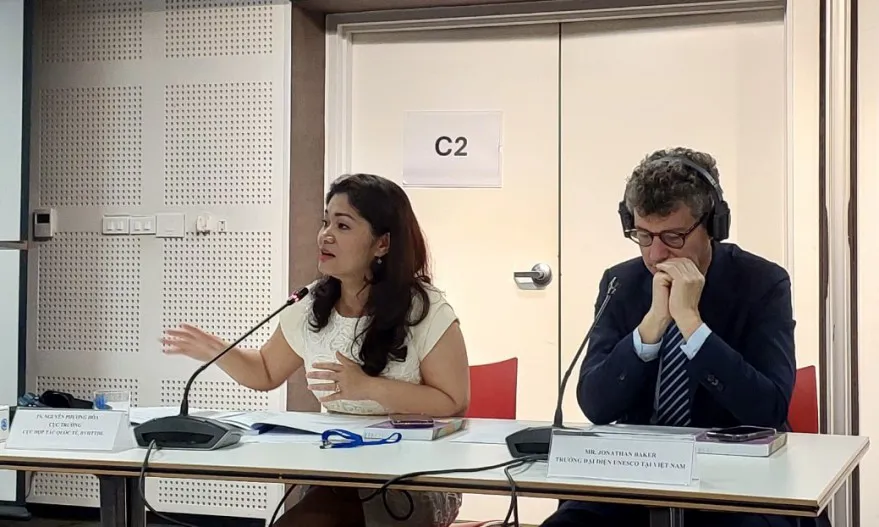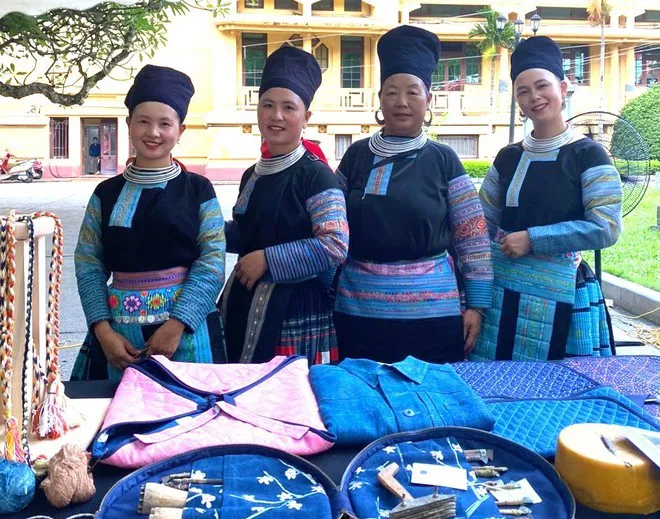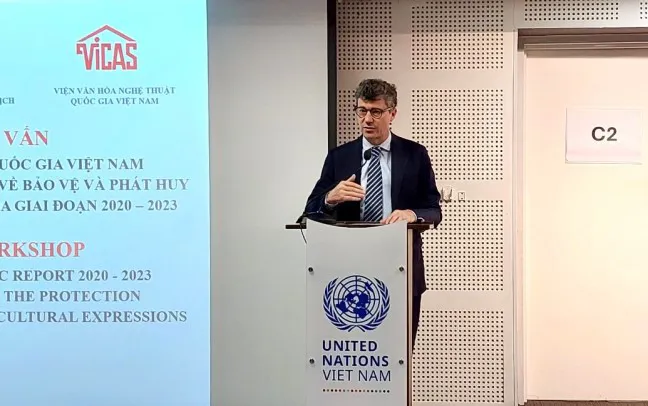Vietnam promotes cultural industries in line with UNESCO Convention
In keeping with the UN's Sustainable Development Goals, Vietnam is fostering cultural industries.
In implementing the 2005 UNESCO Convention on the Diversity of Cultural Expressions, Vietnam has made many outstanding cultural achievements that are relevant to the Sustainable Development Goals (SDGs).
That is the assertion of Nguyen Phuong Hoa, Director of the Department of International Cooperation, Ministry of Culture, Sports and Tourism, at the Consultation Workshop in Hanoi on June 4 on Vietnam's Quadrennial Periodic Report 2020-2023 on the implementation of the UNESCO 2005 Convention.
Achievements
The 2005 UNESCO Convention on the Protection and Promotion of the Diversity of Cultural Expressions is an international legal instrument that enables States to adopt cultural policies and strengthen international cooperation to create an enabling environment for the development of diverse cultural expressions.
| Nguyen Phuong Hoa, Director of the Department of International Cooperation (left) chaired the workshop. Photo: Ngo Minh/The Hanoi Times |
Member states shall, in their quadrennial periodic reports to UNESCO, provide appropriate information on measures taken to protect and promote the diversity of cultural expressions within their territory and at the international level. Vietnam has submitted its Quadrennial Periodic Reports (QPR) for the periods 2008-2011, 2012-2015, and 2016-2019 and is expected to submit its QPR for the period 2020-2023 to UNESCO in June 2024.
Member states' QPRs are essential sources for UNESCO in preparing the Global Report on the Implementation of the 2005 Convention, which will address the progress made in promoting the diversity of cultural expressions, share lessons learned, and showcase best practices of member states in promoting cultural industries, as well as analyze ongoing difficulties and challenges since the previous reports.
Therefore, the workshop aims to create a broad forum for relevant parties to contribute to the national report.
According to Nguyen Phuong Hoa, Vietnam, like other nations, faced severe Covid-19 impact on cultural industries. The value added to the cultural industries' contribution to the economy dropped to 4.32% in 2020 and 3.92% in 2021 from 6.02% in 2019.
Signs of recovery began to show in 2022, with an estimated value-added growth of 4.04%. In 2022, statistics showed that there were about 70,321 cultural industry establishments, employing about 2.3 million people, accounting for 4.42% of Vietnam's total labor force.
| H'Mong women show off their traditional handicrafts as part of the UK/Vietnam Season cultural exchange. Photo: Ngo Minh/The Hanoi Times |
Over the past four years, Vietnam has also shown a remarkable focus on the cultural development strategy, which is in line with the national socio-economic strategy. At the central level, the prime minister in 2021 issued the Cultural Development Strategy to 2030, which sets a number of specific goals for Vietnamese culture to 2030. At the local level, many policies related to the development of cultural industries have also been issued by some provinces and cities, such as Hanoi with Resolution No.09-NQ/TU on the Development of Cultural Industries in the Capital Region in the period 2021-2025, orientation to 2030, and vision to 2045.
Do Thi Thanh Thuy, Head of the Cultural Research Department, Vietnam National Institute of Culture and Arts, listed five outstanding achievements, including the overall consistency of policies and guidelines in raising people's awareness of the development of the cultural industry; the growing attention and investment in the development of creative culture; more recommendations and consultation on policy development; achievements in digital transformation; Vietnam's further integration into the global community.
Things to do
The QPR of the 2005 Convention is prepared based on the Convention's Policy Monitoring Framework, which focuses on four objectives aligned with the United Nations' Sustainable Development Goals (SDGs) until 2030: (1) supporting sustainable cultural management systems; (2) achieving balanced flows of cultural 2 goods and services and increasing the mobility of artists and cultural professionals; (3) integrating culture into sustainable development frameworks; and (4) promoting human rights and fundamental freedoms.
To achieve these goals, Thuy said that in the next four years, Vietnam needs to prioritize refining mechanisms and policies to mobilize resources for the development of cultural industries.
In addition, Vietnam needs to selectively learn from the experiences of UNESCO member countries. The country should build a national data collection system on cultural industries; develop brands for some typical Vietnamese cultural products and cultural and creative services; set up a network of creative cities; and encourage the development of creative cultural products and services in the digital environment.
| Jonathan Baker, Chief Representative of UNESCO Office in Vietnam, speaks at the workshop. Photo: Ngo Minh/The Hanoi Times |
Speaking at the conference, Jonathan Baker, Chief Representative of the UNESCO Office in Vietnam, highly appreciated the attention of the Government, ministries, departments, branches, and localities in the field of culture.
“During this period, the Government of Vietnam has created a favorable policy environment to promote the implementation of the Convention. Vietnamese culture has also made great progress. The country's cultural industry and creative cultural ecosystem are strongly developed. The UNESCO Office is always ready to provide technical support to Vietnam in implementing the 2005 Convention as well as related areas of cooperation between the two sides," Jonathan Baker stated.
In sharing solutions, Pierre du Ville, Chief Representative of the Walloon-Bruxelles Delegation (Belgium) in Vietnam, also stressed the importance of mechanisms and policies to promote cultural industries and administrative procedures for international cooperation.
According to him, bringing Belgian artists to perform in Vietnam and sending Vietnamese artists to Belgium still face cumbersome paperwork, so he hopes the government will continue to find open mechanisms for international cooperation in culture.














